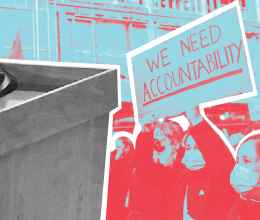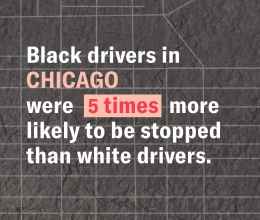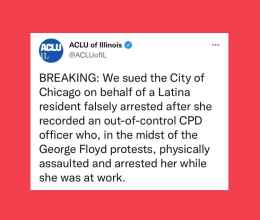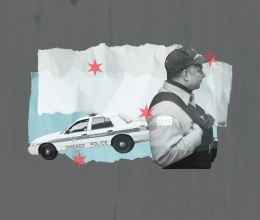
The below statement can be attributed to Karen Sheley, Director, Police Practices Project, ACLU of Illinois:
Today, the U.S. Attorney General Jeff Sessions again falsely asserted that a spike in violent crime was caused by the ACLU’s 2015 agreement with the City of Chicago to ensure that police only use “stop and frisk” when it is constitutional.
Yet again, this administration encourages unlawful behavior and strong-arm tactics, instead of supporting commitments by local police to do the hard work of building respect and relationships with the communities they serve. Black and Latino Chicagoans have lived through the decades of excessive force, unconstitutional and harassing stops, and coercive interrogations leading to false confessions. People have suffered, taxpayers have payed hundreds of millions of dollars for lawsuits against officers, and the police department - having lost the faith of the community - is unable to solve serious violent crimes. Chicago has started to reject these harmful, ineffective tactics. Through the 2015 ACLU agreement and the upcoming consent decree, the City is committing instead to have a police department that follows the rules and truly serves the community.
Before the CPD-ACLU agreement went into effect, the CPD stopped pedestrians at record-high levels and half of these stops were unconstitutional. The number of unconstitutional stops has, thankfully, decreased since the agreement went into effect. Nothing in the agreement prevents the CPD from making lawful stops, and officers have continued to stop pedestrians.
Attorney General Sessions essentially argues that police officers are too scared to do their jobs if they have oversight. This claim insults officers and downplays the harms of unlawful policing.
And contrary to his narrative, other cities have required similar oversight for stop-and-frisk without an increase in homicides. The CPD-ACLU agreement largely tracks a state law that took effect in January 2016, and other cities in Illinois did not experience a similar increase in murder rates in 2016. Likewise, other cities throughout the country such as New York and Seattle have required oversight of stops without homicide increases.
Finally, Attorney General Sessions may want to familiarize himself with events that occurred in Chicago during this period. Beginning in November and December 2015:
- the state budget impasse was starving not-for-profits serving communities in Chicago (which are already starved for resources),
- the City released a video tape showing the police murdering Laquan MacDonald and proving that official reports of his death were false,
- the Mayor publicly admitted the CPD has a code of silence,
- the Mayor fired his police superintendent,
- the Mayor announced a new Task Force would investigate the CPD, and
- the U.S. Department of Justice announced that it was opening an investigation into the CPD.
This local context is necessary to understand the potential causes of crime, the need to curtail excessive stop and frisk, and changes the CPD has been navigating.
We urge the Attorney General to better acquaint himself with these facts before further promoting a revisionist history.



